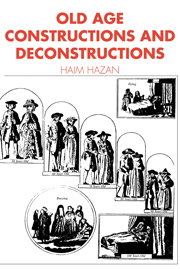Conclusions: the nature of knowledge about ageing
Published online by Cambridge University Press: 05 June 2012
Summary
The separation of selves makes any attempt to address the issue of old age in a given context extremely problematic. The shifting involvements of elderly people are often tacit, and this makes the seemingly tried-and-true concept of context inappropriate to their study. Knowledge about old age must therefore be produced in ways different to conventional socio-anthropological ones. Knowledge and ignorance are socially constructed, and the scope and nature of available knowledge are culturally determined. Knowledge is produced and reproduced by weaving selected units of information into models of interpretation and modes of thinking. The key to this process is discovering the basic assumptions about the world, fundamental beliefs, and root metaphors by which human perception is shaped.
The languages of ageing described in this book are different aspects of a single metalanguage – the dialectics of culture and society. Because context is uninformative here, however, any attempt to develop a vocabulary appropriate to and emerging from the generative grammar of ageing is doomed to failure. Acontextual constructs are rare in socio-anthropological discourse, and those referred to in the course of this book – for example, the symbolic type – do not appear to be adequate to the task of explaining old age. Alternatives to a context-bound perspective might include an approach that sees communication between the old and their human environment as taking place through core cultural codes rather than interaction (Lévi-Strauss 1967; Unruh 1983).
- Type
- Chapter
- Information
- Old AgeConstructions and Deconstructions, pp. 90 - 102Publisher: Cambridge University PressPrint publication year: 1994



